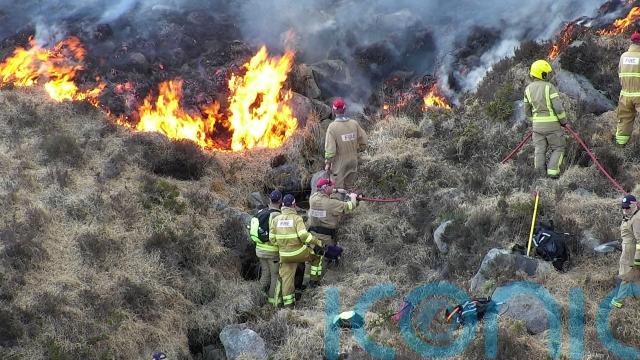
Stormont’s agriculture minister has branded as “bizarre” claims by the Ulster Farmers’ Union (UFU) that granting protected status to hills and mountainsides is leading to more wildfires in Northern Ireland.
Andrew Muir made the comments to his Assembly scrutiny committee in response to the UFU’s criticism of a report from the Office for Environmental Protection (OEP) that called on the minister to increase the amount of designated land in Northern Ireland.
The union doubled down on that criticism in recent days following the spate of wildfires across Northern Ireland.
Firefighters have tackled more than 200 fires since Friday, with many of the blazes focused on upland areas such as the Mourne Mountains.
The Northern Ireland Fire and Rescue Service (NIFRS) said it was dealing with a large gorse fire in Draperstown, Co Derry, on Thursday evening.
Following a large number of wildfires across NI in the last few days, the UFU is highlighting how devastating fires are for farmers and rural communities and is calling for government to recognise the increasing fire risk created by designated sites.
https://t.co/DKrvCQM86e pic.twitter.com/ggwriqrcCx
— Ulster Farmers' Union (@UFUHQ) April 9, 2025
Providing an update on the latest in a spate of fires on Thursday, an NIFRS spokesperson said: “NIFRS are currently in attendance at a large gorse fire at Corrick road, Draperstown.
“Fire appliances from Maghera, Magherafelt, Cookstown and Dungiven are in attendance supported by a command unit from Kilrea and specialist wildfire officers.
“A total of 54 personnel are attending the incident.
“Locals are requested to avoid the area to help support firefighting operations.”
The UFU has argued that the placing of environmental protective designations in these areas is limiting the ability of farmers to manage the land effectively, resulting in uncontrolled growth of heather, gorse and general scrub. This, the union claims, is creating “ideal conditions” for wildfires.
Mr Muir rejected the criticism as he gave evidence to the Assembly’s Agriculture, Environment and Rural Affairs committee on Thursday.
Responding to a question from committee member and party colleague John Blair, Mr Muir said: “The report from the Office for Environmental Protection in regards to our protected sites was difficult reading for me, but I do welcome their constructive proposals, and I’ll be working very swiftly with officials in terms of responding to their findings and recommendations.
“Protected sites in Northern Ireland are jewels in our crown. They are something that we should value. I do find the recent comments from the Ulster Farmers’ Union, frankly, quite bizarre. What we should be doing is we should be protecting those sites, and I would like to see more, not less.”
The minister said his department would be seeking to provide additional methods to allow for better upland management.
“That’s what we want to do and put these places into a better ecological state, because that’s what we should do. And it saddens me that people would view it as otherwise,” he said.

On Tuesday, UFU deputy president John McLenaghan urged Stormont to recognise that designated sites were increasing the risk of fires.
“It’s devastating to see so many areas being impacted by wildfires in recent days including the Mourne Mountains, the north west and County Antrim,” he said.
“Habitats have been completely destroyed, and the damage will be felt for years to come. What needs to be recognised is that the areas affected are mainly designated sites that restrict farmers from managing the land well.
“Farmers cannot carry out controlled burning and there are tight controls on grazing and land management. Heather and scrub are left to grow wild with limited management to control them, and as a result, the land is in ideal condition for wildfires. The restrictions placed on farmers when it comes to designated sites, is quite literally adding fuel to the fire.
“Farmers need to be able to manage the land through a combination of grazing livestock, topping and controlled burning. This reduces the fire load and helps to decrease the risk of wildfires. Hill farmers have the knowledge and expertise to manage this complex landscape and this is crucial to reducing the risk of wildfires.
“An extreme wildfire is not in the best interest of the farmer, the environment or the community, it can be devastating for some farmers as it can take years for the vegetation to grow back.”
Subscribe or register today to discover more from DonegalLive.ie
Buy the e-paper of the Donegal Democrat, Donegal People's Press, Donegal Post and Inish Times here for instant access to Donegal's premier news titles.
Keep up with the latest news from Donegal with our daily newsletter featuring the most important stories of the day delivered to your inbox every evening at 5pm.